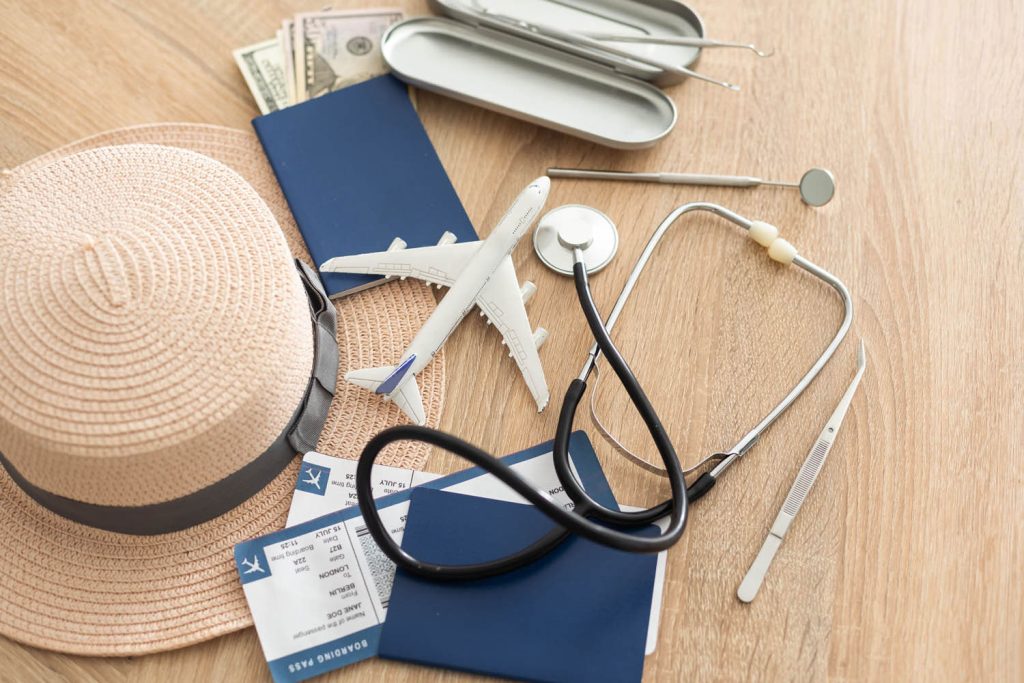After giving birth to two children, fashion vlogger Zee Allure didn’t like what became of her body. “I didn’t look the same. That wasn’t me,” she told Caribbean Beat in a Zoom interview. She felt she knew where to turn: the plastic surgeons of the Dominican Republic (DR) had reputations that were almost legendary.
“I feel like DR is number one,” said Zee, who is 27 and lives in Atlanta. “Nobody could take that spot. They’re the best.”
So, in July 2021, she flew with her mother and toddlers to Santo Domingo for what she called a “surgery-cation”, documenting the experience in a series of videos posted on YouTube. In a video update six months later, she showed off the results of a tummy tuck, liposuction, and a Brazilian buttock lift (BBL).
She listed the myriad costs in USD of the 18-day trip: plane tickets ($1,800); accommodation ($1,450); a nurse ($810); a driver ($250); chef service ($90); massages ($180); a pre-ordered package of post-surgery must-haves like gauze and gloves ($300); and the surgery itself ($6,000).
While she was in the DR, she also got her eyebrows microbladed ($142), her lips plumped ($400), and veneers on her teeth ($2,500). The list didn’t include the costs of shopping and going to various restaurants.
Zee Allure is an example of why destinations court medical tourists. They consume more products and services and therefore spend a lot more money than other tourists.
Among CARICOM countries, the DR has been the most successful at drawing medical tourists, receiving a flood of them every year — most of them for cosmetic procedures. Many of them document their experience — positive and negative — on social media.
The DR is one of only two CARICOM countries on the Medical Tourism Index (MTI), a guide compiled by the International Healthcare Research Center (IHRC) — a nonprofit organisation in the United States (US) — based on Americans’ perceptions of destinations. For the 2020–2021 MTI, the DR is ranked 19 out of 46 countries. Jamaica is ranked 40th, and has been trying to boost its medical tourism prospects for decades.
During a 2021 webinar, Diane Edwards — then president of the Jamaica Promotions Corporation (JAMPRO), the state agency responsible for aiding investment and industry in Jamaica — said they had drafted a medical tourism policy after four years of consultations with government and private stakeholders. An official policy hasn’t yet been put forward.
“I’d say the most consistent story is hearing high hopes from governments and not seeing the sector actually develop,” Dr Valorie Crooks, a health geographer with the Simon Fraser University in Canada, told Caribbean Beat. Crooks’ book, Medical Tourism in the Caribbean Region, is due out next year.
Plastic surgeon Dr Jan Hochtritt — who runs the ProSurgiCare clinic in Kingston and was one of the participants in the JAMPRO webinar — believes Jamaica can benefit from cosmetic surgery patients.
Zee Allure is an example of why destinations court medical tourists. They consume more products and services and therefore spend a lot more money than other tourists
“There was a case where a Jamaican went to the DR to do a procedure and came to me about a complication. When I asked her about her implant, she did not know that she had received an implant over there,” Hochtritt told the Jamaica Observer earlier this year. “Some doctors there do not speak English well and some Jamaicans do not speak Spanish well. That can lead to problems.”
“Medical tourism can contribute significantly to the Jamaican economy and we believe the island will do very well if we promote the sector,” says Hochtritt. During the webinar, he explained that 40% of his patients visit from other countries, and of that number about 95% were from the Jamaican diaspora — Jamaicans or their descendants living abroad.
This is in line with a 2018 PricewaterhouseCoopers report for JAMPRO aimed at developing medical tourism in Jamaica. A survey of 27 private surgical clinics found that 20–30% of their income was derived from foreigners, most of whom (56%) were from the Jamaican diaspora. The rest were from other Caribbean countries and elsewhere.
In a podcast interview last year, Crooks — who defines medical tourism as health care intentionally sought by visitors, to distinguish it from emergency care — talked about the importance of the internet in boosting a destination. Social media in particular plays a big part in the DR’s popularity.
“There’s a lot of networking among people who are thinking of going abroad … chat rooms and discussion boards, for example, websites where patients are talking about their experience,” says Crooks. “So this is how you can build up the reputation of a particular destination.”
Another challenge Caribbean medical tourism has faced is the limited number of medical facilities with accreditation from top international agencies. This is a significant consideration given that the IHRC, in its Medical Tourism Patient Survey, found that more than 63% of patients said accreditation influenced their choice of provider.
Among the highest regarded international accreditors is Joint Commission International (JCI), based in the United States; only three CARICOM providers are JCI accredited — though others have sought accreditation from other organisations.
“The problem is that our local accreditation process may not quite align with the JCI accreditation process,” explained cardiologist Dr Ernest Madu, who founded the unaccredited but reputable Heart Institute of the Caribbean in Kingston, in the JAMPRO webinar. “If we do not align those processes with international standards, we will not get international accreditation; and if we do not get international accreditation, patients will not come in droves.”
Madu continued by explaining that the range of things providers are required to put in place for accreditation are the same things that improve patient outcomes and inspire confidence in would-be clients. He emphasised that all the available data and research support this.
Many providers do share Madu’s perspective on the value of accreditation — with those offering fertility treatments chief among them. The Trinidad & Tobago IVF & Fertility Centre, with two locations in Trinidad, has accreditation from TEMOS (Trust Effective Medicine, Optimised Services), based in Germany.
Services like IVF and egg freezing are far cheaper in the Caribbean than in the US or European Union. The wait times for an appointment also are often far shorter, while the tropical island location of these clinics is among the reasons people seek medical treatment in the Caribbean. It helps them feel like they’re vacationing while seeking their respective medical treatments.
Zee believes the social media community can reduce bad outcomes for any medical procedure or treatment. She took her mother to give support and help take care of her two young children. Possibly most important, she prepared long in advance — six months, to be exact.
“Don’t just decide you’re gonna do surgery and then leave in two months,” she said. “Prepare. You need more time to buy the things you need. You have to build your [blood] iron. And you need to be mentally ready as well.”
Advertorials
Caribbean Heart Care Medcorp Ltd
CHCm, providing holistic cardiovascular care in the Caribbean, offers first-class service through our very own British, American, and Canadian certified team of professionals. Home to the most advanced catheterisation lab, revered by doctors worldwide, CHCm celebrates over 30 years of providing innovative treatments and cutting-edge technology, committed to your best medical care. Leading the way in emergency cardiovascular care — ensuring healthier Caribbean people — our heart is set on saving lives.
Hyatt Regency Trinidad
Located on the serene waterfront of downtown Port of Spain, Hyatt Regency Trinidad is an oasis for recovery, rejuvenation and relaxation, as well as the perfect setting for your next meeting or conference. Find luxurious, comfortable accommodation and suites with adjoining rooms, panoramic views of the gulf, our 9,000 square-foot Spa Esencia, and an expert culinary team ready to assist with meals according to your dietary requirements. For reservations and more information, visit hyattregencytrinidad.com or e-mail trirt.reservation@hyatt.com.
St Augustine Medical Laboratory Ltd
Changes in your DNA can lead to cancer (eg colon, breast, and lung, to name a few). The investigation of your genes can impact your care — and Next Generation Sequencing (NGS) is here! NGS allows us to use precise, targeted treatments that focus on a person’s genetic makeup rather than a blanket approach. Its accuracy and precision are game-changers in medicine. Let’s not forget inherited cancer, eg BRCA gene mutations leading to a greatly increased chance of breast cancer. NGS can identify your inherited risk before the disease even occurs — revolutionising medicine!
The Trinidad & Tobago IVF & Fertility Centre
European Accredited • Excellent Success Rates • Complete Fertility Services
The Caribbean leader in fertility treatment, TTIVF achieved the English-speaking Caribbean’s first IVF baby, and has brought more than 3,000 babies into the world. We provide the full range of fertility treatments — from IVF and IUI, to egg freezing. Ethical and affordable, and known for excellent success rates and healthy pregnancies, TTIVF is also home to the region’s largest, most diverse egg bank.

